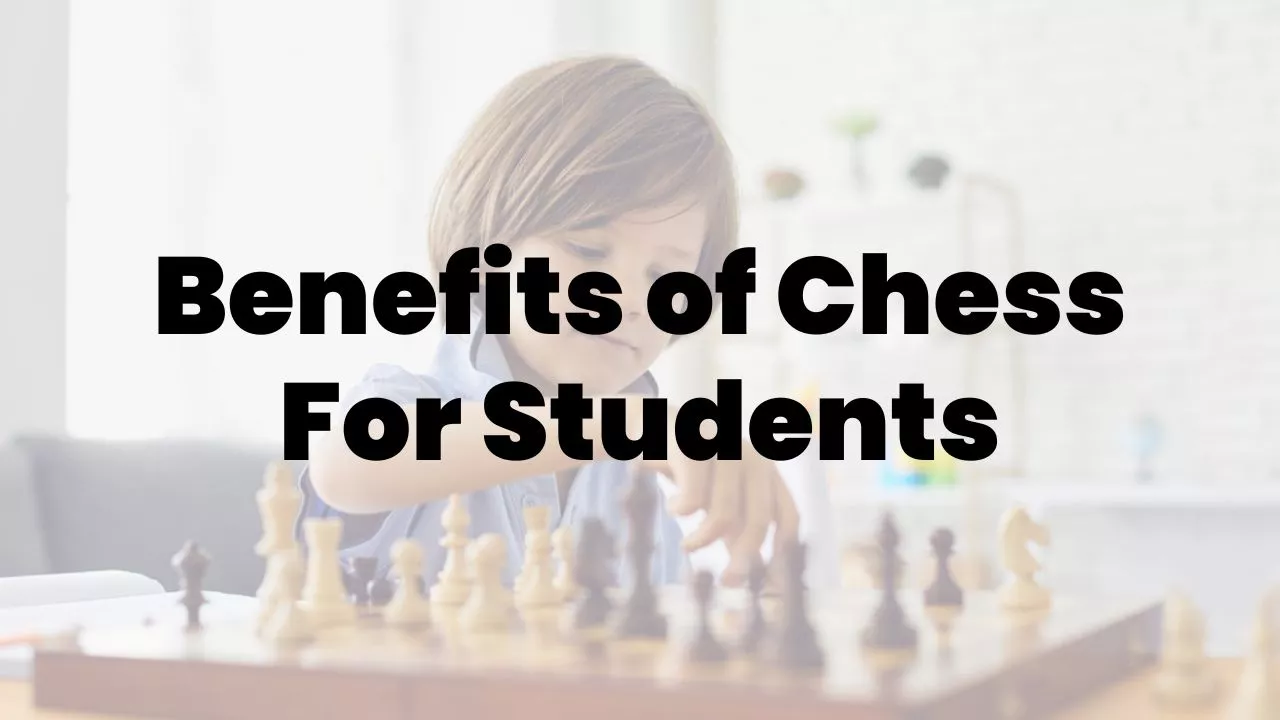18 Benefits of Chess for Students

Chess, the game of strategy and intellect, has captivated minds for centuries. Beyond its recreational value, chess has been hailed as a powerful educational tool, particularly for students. In this article, we will delve into the numerous benefits of chess for students, exploring how the game enhances cognitive abilities, fosters critical thinking, and promotes personal growth. By embracing chess, students can unlock a realm of intellectual and developmental advantages that extend far beyond the chessboard.
1. Concentration and Focus:
Chess demands sustained concentration and focus, requiring players to analyze positions, plan ahead, and anticipate their opponent’s moves. Regular chess practice helps students improve their attention span and develop the ability to concentrate for extended periods. This is one of the most important benefits of chess for students.
2. Memory Improvement:
Chess entails remembering and recalling numerous moves and strategies. By playing regularly, students can enhance their memory capacity, strengthening their ability to retain and retrieve information.
3. Problem-Solving Skills:
Chess is essentially a series of complex problem-solving tasks. Players must assess the situation, identify patterns, and strategize accordingly. Through chess, students sharpen their analytical skills and cultivate their problem-solving abilities.
4. Logical Reasoning:
Chess is a game governed by strict rules and logical principles. Students must learn to reason logically, deduce consequences, and evaluate possibilities. This skill set transfers to other areas of their academic and personal lives, enhancing their ability to approach challenges with a logical mindset.
5. Analytical Thinking:
In chess, students are constantly analyzing positions, evaluating potential moves, and predicting outcomes. This process fosters critical thinking and encourages students to consider multiple perspectives before making decisions.
6. Strategic Planning:
Chess necessitates strategic planning and foresight. Students learn to assess their current position, devise a long-term plan, and adapt their strategies based on their opponent’s moves. Through chess, students develop the invaluable skill of thinking strategically and weighing the consequences of their decisions.
7. Risk Assessment:
Chess teaches students the importance of evaluating risks and rewards. They learn to take calculated risks, assess potential outcomes, and make decisions based on careful analysis. These skills are invaluable in real-life situations, equipping students with the ability to make informed choices.
8. Patience and Perseverance:
Chess is a game that requires patience and perseverance. Students learn to persist through setbacks, adapt to changing circumstances, and strive for improvement. This resilience translates into their academic and personal lives, enabling them to overcome challenges and setbacks with determination.
9. Sportsmanship and Ethics:
Chess instills the values of sportsmanship and fair play. Students learn to respect their opponents, accept defeat graciously, and celebrate victories humbly. These principles foster a positive and ethical mindset, shaping students into well-rounded individuals.
10. Confidence and Self-Esteem:
As students progress in chess, they witness their skills and knowledge grow. This sense of achievement boosts their confidence and self-esteem, instilling a belief in their abilities to tackle new challenges.
11. Mathematics:
Chess involves calculations, spatial reasoning, and logical thinking, all of which are closely related to mathematical skills. Students who engage in chess often exhibit improved mathematical abilities and problem-solving aptitude.
12. Reading and Language Skills:
Chess promotes reading and language skills through the study of chess literature, analysis of game notations, and engagement in chess-related discussions. Students often explore chess books, articles, and online resources, expanding their vocabulary and comprehension abilities. Additionally, chess notation, which uses a unique system of symbols and abbreviations, encourages students to develop their reading and interpretation skills.
13. Creativity and Imagination:
Chess encourages students to think outside the box and explore creative solutions to complex problems. As they encounter different game scenarios, students are challenged to develop innovative strategies and consider unconventional moves. This fosters creativity, as they learn to approach challenges with an open mind and embrace alternative perspectives.
14. Time Management:
Chess is a game that requires effective time management. Players must allocate their time wisely, considering the value of each move and balancing it with the available time on their clock. This skill translates into better time management in academic settings, helping students prioritize tasks, meet deadlines, and maintain a balanced approach to their studies.
15. Improved Concentration and Study Habits:
The focus and concentration required in chess transfer to other academic pursuits. Chess teaches students to eliminate distractions, maintain mental clarity, and engage in deep concentration for extended periods. These skills directly contribute to improved study habits and academic performance.
16. Enhanced Problem-Solving Skills:
Chess presents students with complex problems that require analytical thinking and strategizing. As students encounter various scenarios on the chessboard, they develop an innate ability to break down problems into smaller components, analyze them systematically, and find effective solutions. These problem-solving skills can be applied to a wide range of academic subjects and real-life situations.
17. Teamwork and Collaboration:
While chess is primarily an individual sport, it also offers opportunities for teamwork and collaboration. Students can participate in team competitions, analyze games together, and learn from each other’s experiences. Such interactions foster a sense of camaraderie, teach students to work collaboratively, and develop their interpersonal skills.
18. Stress Reduction and Relaxation:
Chess provides a platform for students to unwind, relax, and alleviate stress. Engaging in the game allows them to divert their attention from daily pressures and immerse themselves in a mentally stimulating activity. The strategic nature of chess engages their minds, promoting relaxation and mental well-being.
Conclusion (Benefits of Chess for Students):
Chess is far more than a mere game; it is a powerful educational tool with a multitude of benefits for students. From enhancing cognitive abilities and critical thinking skills to fostering emotional development and improving academic performance, chess has the potential to shape students into well-rounded individuals. By embracing chess, students unlock a world of intellectual growth, personal development, and lifelong learning. So, encourage students to pick up the chessboard, and watch them embark on a remarkable journey of self-improvement and achievement.
Want to learn Chess? Join SMCA, India’s leading chess academy.



